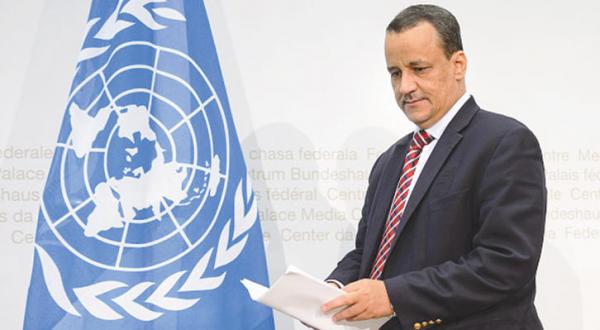Jeddah- The Yemeni government ruled out any compromises being made at the anticipated Geneva Yemeni peace talks with the Houthi militia delegation.
Even though several countries in the West are throwing in their weight over certain topics, Yemen’s legitimate government confirmed that no new items will be enlisted on the agenda for the talks without referring to the Saudi administration for coordination.
An official at the Yemeni legitimate government led by President Abd Rabbuh Mansur Hadi told Asharq Al-Awsat newspaper that preparations for the end-of-March Geneva talks with Houthis are ongoing.
He added that particular pressures are being exercised on the Yemeni government to accept conditions which will bring perspectives closer among those negotiating; however, the proposed conditions remain indirect and unofficial.
The official stressed that there will be no lateral agreements struck between the militias and the government, the latter had already decided in its last meeting not to make any compromises.
The government, despite all pressures put in by other countries, is dedicated to the implementation of U.N. resolution 2216.
No negotiations will take place out of context of resolution 2216 with Houthi militias, the official underlined.
It is noteworthy that the Yemeni government will not use a solo approach for the decision making process, yet instead will coordinate with Gulf countries, especially the Kingdom of Saudi Arabia.
All preparations will be pre-coordinated with the Saudi government, particularly for the peace talks which the Yemeni legitimate government considers a center for deliberations without set limitations or conditions.
The militias have no other option but to implement the U.N. resolution issued in April, 2015. The resolution imposes sanctions against Abdul-Malik al-Houthi, Ahmed Ali Saleh and the former commander of the Yemeni Republican Guard. They are all accused of subversion against the security and stability of Yemen.
The resolution also forbids supporting Ali Abdullah Saleh, former President of Yemen, and his son with arms and artillery. It also stipulates that ceasefire and withdrawal of forces is mandatory form regions dominated by militias, including Sana’a.
Any addition to the resolution will not be accounted for by the legitimate government, which has already outlined all its principal goals over the last meeting it held with the National Army of Yemen.
As for the economic truce with the Houthi insurgents, a Yemeni governmental official confirmed that the truce will come to an end, after Houthis not keeping their end of the deal, and preserving the country’s resources. Moreover, the insurgents have meddled with the Yemeni governmental financial reserve.
Houthis refused employing gas and oil companies, which violates the conditions of the agreement. The truce was based on Houthis not taking solo with Sana’a under their control.
The source clarified that information obtained by the government reveal Houthi leaderships going for the dissipation of the money over the upcoming few days, which will in turn have the country stoop down to greater economic disaster.
All and above, several Houthi leaderships, who lead the insurgency in Yemen along with officers from the Republican Guard, have fled Yemen to the Iranian capital Tehran.
Some of the insurgent leaders have escaped to a fellow Gulf country which will be kept anonymous for the preservation of political and fraternal affairs with the country.
SPA reported another official source at the Yemeni government who confirmed that the government has already formed a committee to investigate into a popular market bombing in Hajjah province.
The source told Yemen News Agency (SABA) that: “The government in collaboration with the command of the Arab coalition formed a team to begin an investigation into a popular market bombing in Hajjah province, resulted in the killing and injury of a number of people.”
“The team will investigate into the results and getting facts on the ground through the testimonies of civilians, and whether the shelling was the result of raids by Arab coalition forces, or the result of bombing by the Houthi militias which were deliberately committing brutal massacres and atrocities against civilians, then as usual they blame the national army, popular resistance and countries of the Arab coalition for their mistakes,” he added.
The official source pointed out that Houthi militias and Saleh are the main reason behind the current instability and bombing of people gatherings and popular markets. In these places, among innocent people, militants are sniping civilians and destabilizing public security and stability.

